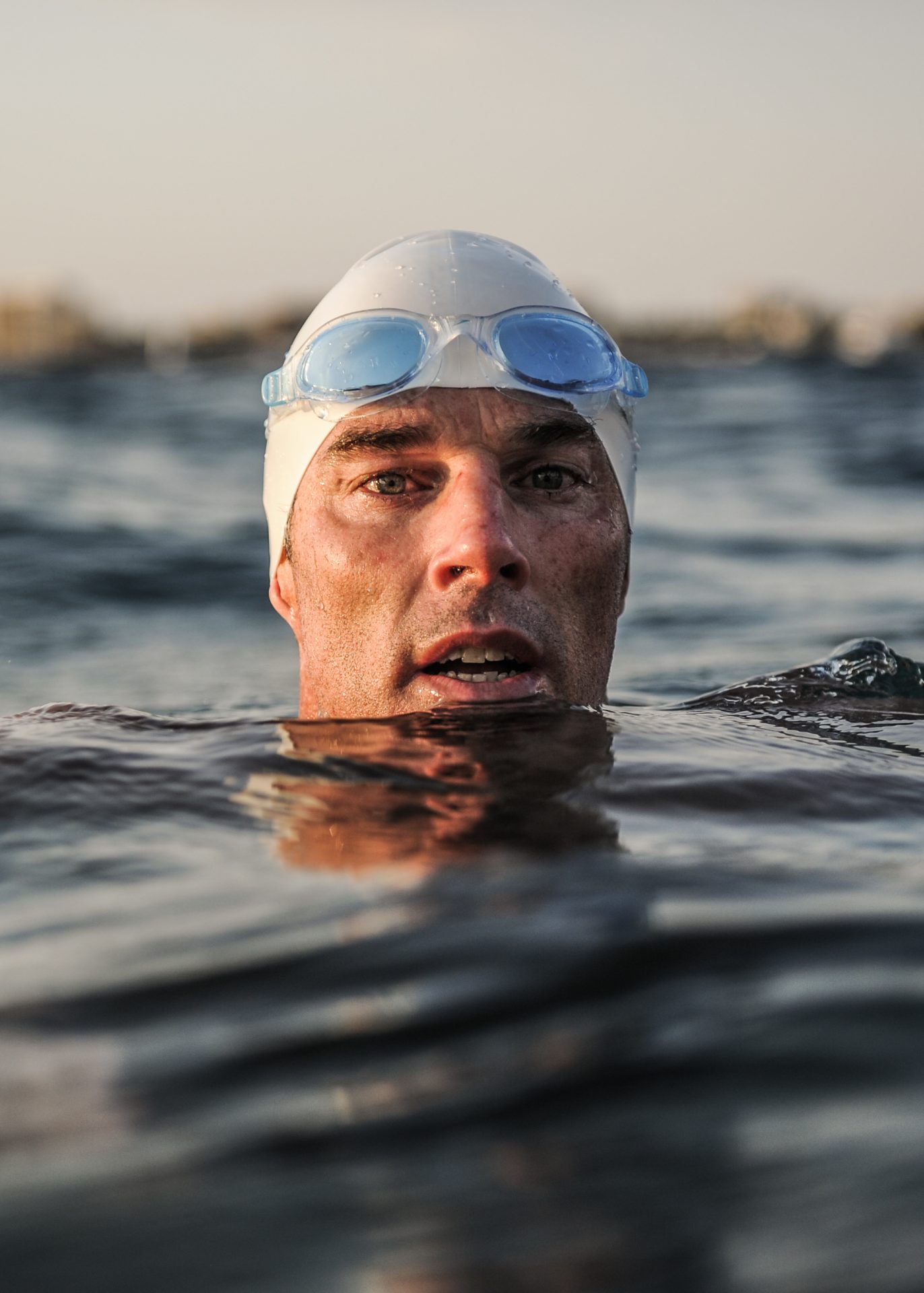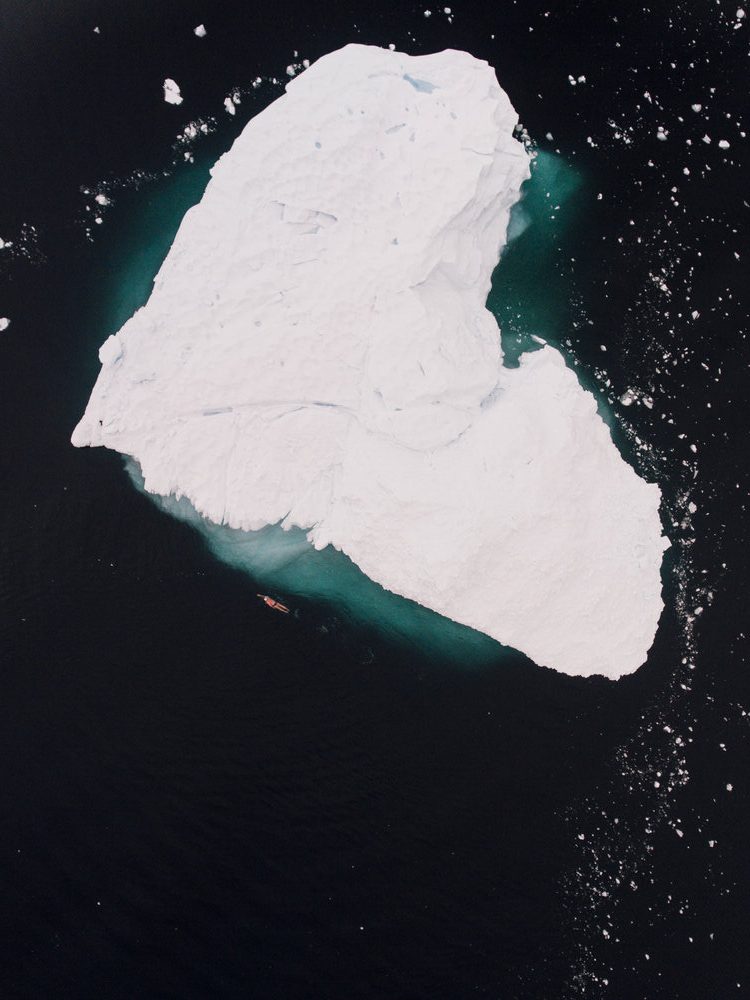British-South African Lewis Pugh has been a pioneer in long-distance swimming for close to 30 years. He was the first person to complete a long-distance swim in every ocean of the world, his most well-known expedition being the first-ever attempt to swim across the North Pole in 2007. This effort was to highlight the melting of the Arctic Ocean ice. His latest endeavour was to swim down a river under the Antarctic ice sheet to call for greater protection around the continent.
Pugh frequently swims in vulnerable ecosystems to draw attention to their plight. What drove him to take a stand was an accumulation of factors: the expansion of glacial lakes in the Himalayas due to global warming, plastic pollution in the most remote parts of the ocean, and garbage filling beaches to the extent that you can no longer see the sand. In 2015, he was one of 10 adventurers nominated for National Geographic Adventurer of the Year. And this year, Pugh’s The Long Swim (a gruelling 560km-swim across the English Channel in 49 days in August 2018) won Best Environmental Cause at PR Week’s Campaigns for Good Awards.
Pugh claims his decision to become an ocean advocate didn’t happen all at once. It began with the stories of adventure he heard as a child, and the world maps that his father kept in their home that oozed with possibility. His sense of determination became apparent after his first Robben Island swim at the age of 17, which taught him how important it is to finish a job. ‘(It) gives you the power and the energy to go on to even bigger things,’ he says. His sense of justice developed while studying law at the University of Cape Town in South Africa during the cessation of the apartheid era.
This legal grounding would stand him in good stead during his career as it taught him how to argue passionately and rationally. ‘That’s the key to a successful environmental campaigner. If you are too emotional you run the risk of putting off policy makers.’ He realised that it would require a different kind of action to bring the changes the world needs to protect vulnerable natural resources. And so, he began talking… to national and citizen leaders, policy makers, environmentalists, scientists and the media. (Pugh now delivers around 100 talks a year.)
CAMPAIGNING FOR PROTECTION
A Russian journalist used the expression ‘Speedo diplomacy’ to describe what Pugh does. It’s a ‘fair amount of swimming, and a great deal of listening’, he says by way of explanation. But his campaigns have gone a lot further than using swimming to draw attention to ecosystems; they now included engaging with the people and powers that can make things happen. In 2013, Pugh was appointed United Nations Patron of the Oceans, which entails spearheading the campaign for more marine protected areas (MPAs) around the world. Only 3.6% of the world’s oceans are actively managed MPAs.
He and his team have been actively promoting many good causes but the campaign that Pugh is most proud of is the one that has consumed him for the last three years and will continue to do so – increasing the protection of vulnerable Antarctica. This is what led to the river swim under the antarctic ice sheet this week.
The team’s first success was the declaration of the Ross Sea as an MPA. Starting with the river swim the 2020 campaign intends to expand that protection to the seas of East Antarctica, the Weddell Sea and the Bellingshausen Sea which will bring the total area of MPAs in Antarctica to roughly the size of Australia.
GENOCIDE IN THE WATER
In 2015, Pugh set out to complete five record-breaking swims in the Antarctic to help ‘save the Ross Sea from irreversible damage’. Pugh’s efforts were to gain global s
upport for this region to become an MPA, as it is one of the most pristine marine ecosystems on the planet. The area is hugely significant to marine biologists and conservation groups who still have much to learn from this place.
Pugh’s mission involved diving into waters further south than any other human had before. These swims were the most
challenging and dangerous ever undertaken, in water temperatures between 0°C and -1,7°C. The swim at the Bay of Whales in the Ross Sea on 28 February 2015 was the big one because it was the furthest swim south ever undertaken. Katabatic winds rushed down the cliffs to meet the world’s southernmost body of open water, plunging the air temperature to -37°C. The team had been at sea for15 days, during which time Pugh had only managed about 740m of training, thus giving him little chance of acclimatising. As it was to be the m
ost dangerous swim of his life, this was worrying. ‘Fear is helpful, panic is deadly,’ he reflects. ‘I rely on a healthy amount of fear to raise my core temperature; voluntary thermogenesis is what allows me to swim in extreme conditions. Panic undoes all that.’
After 100m, the first digits of his fingers were bone-white. At 200m, the white spread to the second knuckle, and at 300m he couldn’t feel his hands. ‘At 350m, I knew it was time to get out of the water.’ Although he felt positive about the swim after days of training, which included swimming around Cape Horn (at a latitude of almost 56 degrees south) twice because he hadn’t completed the required distance first time around, Pugh had never imagined coming so close to drowning. ‘People think the more swims you do, the easier it gets.
Through sheer force of will, they made it. Pugh’s message about the desperate need to protect the Ross Sea was gaining traction. March that year saw the team’s final swim at Peter Island. This event helped Pugh realise that while he had been concentrating on promoting an MPA in the Ross Sea, there were 13 seas around Antarctica, all under threat, and all deserving of protection. It was the end of The Five Swims expedition, but the beginning of the campaign of his life.
In October 2016, the team celebrated a momentous victory with the creation of the Ross Sea MPA that was to set the precedent for future ocean protection. Since then, they have worked on securing additional MPAs in Antarctica.
SAFETY CONCERNS
For Pugh, Grytviken, South Georgia, in the Southern Ocean was the most beautiful place he’d ever seen. It was November 2017, and as swim day dawned, he could still remember his encounter with the Arctic waters that almost cost him his life. He didn’t want to go through the trauma of severe hypothermia again. However, with clear skies and still waters, this time it wasn’t the cold that was going to be a problem. The wildlife here was a significant issue. He was about to swim in one of the world’s most important biodiversity hotspots, where no human had ever swum before. In all his years of swimming, this was the largest number of safety crew that he had had around him. Three circles of defence that included safety paddlers beside and behind, a safety boat alongside and Dr Roger Melvill in a high-speed rescue boat ready to race him back to the ship in the event of an emergency. ‘My Arctic swim had taught me that even with 30 years’ experience, things can go very wrong.’
They say you should never try anything new on a race day, but this time Pugh decided to do something different. Given the likelihood of predators in the area, he warmed up by kayaking the route first instead of diving straight in and taking note of strategic landmarks, such as the group of elephant seals around the halfway mark.
This region, with its incredible wildlife, is the most important haven under British jurisdiction. Yet, only 2% of the waters around South Georgia and the South Sandwich Islands are fully protected. Pugh was swimming to remind people of what it is they need to protect. He dived in from the slipway in front of the scientific station on King Edward Point, and prayed that the elephant seals would stay where they were. They did. He once again swam over whalebones on the sea floor, a painful reminder that more than 175 000 whales had been slaughtered here.
THE LONG SWIM
The English Channel swim in 2018 was not the first time Pugh found himself in these waters, but it was the first time someone was attempting to swim its entire length: from Land’s End to Dover. Pugh and his team took on this challenge to send a message to the British government that only seven out of 750 000 km2 of the UK’s coastal waters were fully protected. Pugh called this campaign The Long Swim, and it certainly lived up to its name. UK Environment Secretary Michael Gove was there to greet him as he touched the wall at Dover Harbour. A month later, the UK supported Pugh’s call for 30% of oceans to be protected by 2030.
It has been one year since The Long Swim. Since then, the British government, with encouragement from all political parties, created 41 new marine conservation zones around England, fully protected a further 264 000km2 of sea around its territories in South Georgia and the South Sandwich Islands, and earmarked over 400 000 km2 of sea around Ascension Island for full protection. Further developments made in-house include the government banning some single-use plastics. The Foreign Office, with embassies across the globe, has reduced its use of single-use plastic by 98% and challenged other government departments to do the same. For the new prime minister, the issue of climate change will present a stark reality. ‘Brexit may be the topic of the moment, but protecting the environment is the defining issue of our generation,’ Pugh says.
Following a story like Pugh’s gives us hope that there are people in the world working tirelessly to create change. He shows us that you can combine your passion with cause, and genuinely make a difference.
 Q&A
Q&A
Is it about being the first?
Being the first person to swim around a cape or across a lake or down a river is always special. But I swim because I want to draw attention to the state of our oceans – and to get them protected. And if you are first, it gets a lot more media attention. So being first is important.
Why no wetsuit or dry suit in the freezing water?
I ask world leaders to do everything they can to protect our environment. However, sometimes the legislation I ask
them to enact is unpopular with the electorate. If I am asking them to be courageous, I must also be. Swimming in a wetsuit or a dry suit would not send the right message. I swim according to Channel Swimming Association rules, which is just a Speedo swimming costume.
Did growing up in South Africa influence you?

Yes, of course. It was impossible not to be inspired by people like Nelson Mandela, Desmond Tutu and Molly Blackburn. Men and women who stood up for freedom, equality and justice. Each generation will be faced with its challenges. But the ones we face today are like none we have ever faced before. The destruction of our environment threatens our very existence. To simply watch it unfold is not an option.
What’s the main lesson you’ve learnt from your various expeditions?
Very few things are impossible to achieve, if you put your mind to it. That’s the key – really putting your mind to it. When you’ve got purpose, everything becomes possible. And, obviously, don’t quit. Many battles are only won in the 11th hour
Compiled by Sam Hale
* Information obtained from lewispugh.com.








